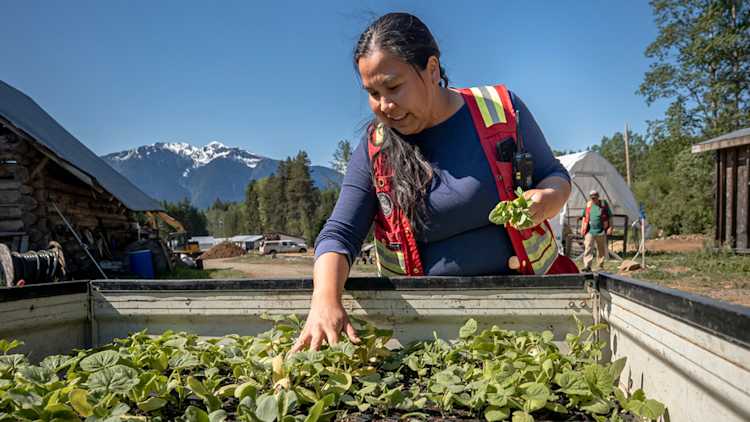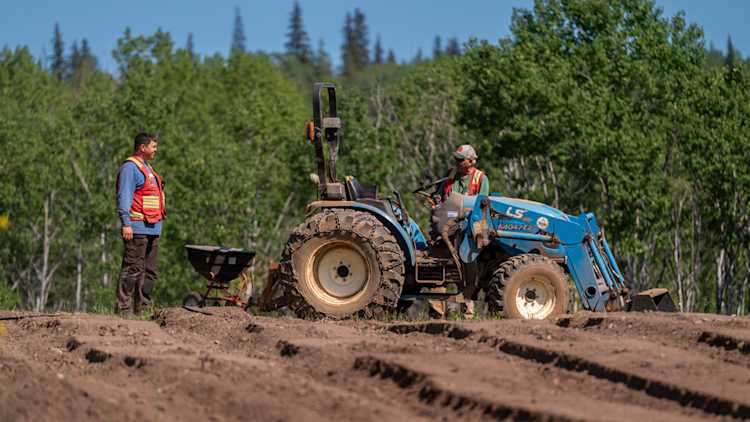Leading with purpose: How Tea Creek is transforming Indigenous agriculture

On a farm in northern British Columbia, big changes are taking root. What started as a family farm has grown into Tea Creek – an award-winning, Indigenous-led training farm dedicated to revitalizing food sovereignty and empowering the next generation of Indigenous farmers.
At the heart of Tea Creek is Jacob Beaton, who holds the given name Dzap’l Gye’awin Skiik, meaning “a busy eagle” – a fitting title for someone determined to reshape Indigenous agricultural education.
Alongside his wife, Jessica Ouellette, and their sons, Noah and Ezra, Beaton has built more than a farm; he’s created a place where Indigenous people can reconnect with the land, develop practical farming skills and overcome barriers to Indigenous participation in the agriculture industry in Canada.
A hands-on approach
Unlike programs that rely heavily on classroom instruction, Tea Creek offers hands-on, land-based Indigenous food sovereignty and trades training designed to foster real-world success. Beaton suggests that for many individuals, classroom-based learning may not be the most effective approach.
“There’s a small minority who excel in traditional classroom settings, but for many, particularly in First Nations communities, hands-on experiential learning tends to be more engaging and impactful,” Beaton says.
With a focus on practical skills, small class sizes and cultural safety, Tea Creek illustrates that an alternative approach to agricultural education is possible and often crucial for success.
Toward year-round training
Tea Creek’s model is designed for long-term success. “We get funding for shorter programs, like eight-week courses. We’d love to offer more long-term options,” Beaton says. After all, it takes years of hands-on experience to build real expertise and capacity.
Tea Creek advocates for year-round, competency-based training that includes cutting-edge technology and methods.Short-term program support has provided a strong starting point, but Tea Creek advocates for year-round, competency-based training that includes cutting-edge technology and methods. This approach acknowledges the time and dedication required to equip Indigenous farm managers and land stewards.
Beaton’s business-minded persistence shows that with sustained funding for long-term training, this model could scale to tackle the agricultural labour crisis and empower Indigenous communities. He advocates for tailored, reliable funding that meets the unique needs of his farm and its goals.
Securing adequate, long-term funding has been a significant challenge. The organization has relied on government grants, industry support and private donations. “It’s private citizens and the private sector who have kept our lights on,” Beaton says.
“We’ve proven that this model works,” Beaton says, pointing to their success in introducing over 450 Indigenous people to skilled trades in 2021.
Indigenous food sovereignty: A path to empowerment and resilience
Indigenous food sovereignty and food security are at the core of Tea Creek’s mission. “I’ve become very passionate about it,” Beaton says. “It’s an Indigenous way of thinking around food production – about working within nature, not against it, and reducing dependency on outsiders.”
The stakes are personal. Beaton grew up food insecure. “There was a stretch of my childhood when we didn’t have enough to eat. My two younger siblings nearly died from it,” Beaton says. “That trauma stays with you. When I see that in other kids, I think, ‘No. You’re getting as much food as we can give you.’”
Although food security remains a critical concern, it’s just one part of a larger picture – because protecting Indigenous food systems also means protecting the land, water and biodiversity that sustain them. “This isn’t just a social or altruistic push; it’s data-based,” says Beaton. Indigenous communities play a pivotal role in safeguarding biodiversity and managing ecosystems, despite having limited resources.
That sense of responsibility shapes Tea Creek’s work today – to grow food and rebuild the systems that once fed entire communities. Many First Nations and Indigenous communities are in rural and remote areas, dispossessed of arable lands and excluded from economic participation.

“These food-producing lands used to be vibrant. Many have gone down to zero production,” Beaton says. “And 50 per cent of our trainees want to dedicate their lives to the food economy. They need the barriers removed.”
Tea Creek’s capacity-building approach is critical not only for Indigenous communities but also as a scalable, shareable solution for rebuilding local economies and increasing resilience across Canada.
“This is the solution to recreating food security and food sovereignty – not just for us as Indigenous Peoples, which is critical, but for us as a country, which is becoming very critical,” Beaton says. “Indigenous-led economies create more local jobs and generate stronger multiplier effects.”
The importance of partnerships
Beaton emphasizes that investment is key. That’s where support like the recent funding from FCC plays a role. With a commitment of $250,000 to Tea Creek, FCC is supporting the economic inclusion of Indigenous Peoples in agriculture and food and helping to address barriers into the sector.
“FCC is stepping in as a supporter of the Indigenous food sovereignty movement,” Beaton says. Commitment like this also helps to build equity. “You need equity first – then reconciliatory action can follow to repair what’s been broken.” FCC is contributing to a foundation for meaningful reconciliation, ensuring that Indigenous communities are empowered to lead the way in their own food sovereignty.
When collaborations are grounded in respect and shared purpose, they can help remove barriers and create space for Indigenous-led solutions to take root. FCC’s support reflects how institutions can help enable progress by standing alongside initiatives like Tea Creek and contributing to the conditions needed for lasting and meaningful change.
A vision for the future
Tea Creek’s long-term goal is to build a national network of Indigenous-led agriculture initiatives that revive and teach Indigenous agriculture. The farm aims to ensure Indigenous communities are central to decision-making and resource management. “We’re preparing to partner with policymakers and resource managers to transform agriculture in this country,” Beaton says.
This vision extends beyond Tea Creek itself. “Ideally, we’ll have a partner across the table who says, ‘Wow, you’ve really got something here, and we want to win together,’” Beaton says.
Moving forward with hope
Tea Creek continues to push forward with optimism. “There are a lot of exciting developments happening. There’s a lot of hope and progress, and we continue to push forward,” Beaton says. The farm is featured in a documentary titled Tea Creek, which has received positive recognition, helping to raise awareness and support for its work. “The film is doing really well. It’s resonating with both Indigenous and non-Indigenous audiences,” Beaton says.
Community support has been a driving force behind Tea Creek’s success. Beaton recalls a meaningful moment: “A retired farmer watched the film and said it was the most moving film he’d seen in a while. He even sent Christmas cards to all his family and friends, saying that all he wanted for Christmas was for them to watch the film. It was such a powerful moment. That just gave me so much hope.”
Tea Creek’s story is one of resilience and hope, showing that meaningful change is possible when communities and allies unite to invest in reconciliation, equity and future food sovereignty.
Key lessons from Tea Creek: Training, collaboration and partnership
Employ hands-on education for real-world success
Hands-on, competency-based agricultural training is essential for long-term success in Indigenous food sovereignty. Tea Creek emphasizes practical experience to develop skilled, confident Indigenous farmers.
Partner and collaborate for long-term success
Collaboration and strong partnerships are critical for meaningful change. Tea Creek’s collaboration with Indigenous communities, industry and policymakers is helping to empower Indigenous Peoples and drive progress in agriculture.
Invest in an equitable, positive future
By supporting Indigenous-led agricultural initiatives, we invest in a future where communities thrive, Indigenous practices are revived, biodiversity is supported and food sovereignty is restored. Tea Creek’s vision of hope and resilience shows the power of collaboration in reshaping the agricultural landscape in Canada.
Don’t miss the Tea Creek documentary. Stream it on CBC Gem.
From an AgriSuccess article by Emily Leeson.
